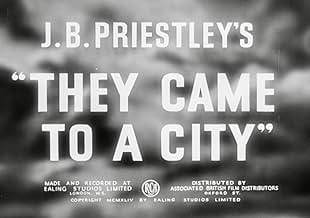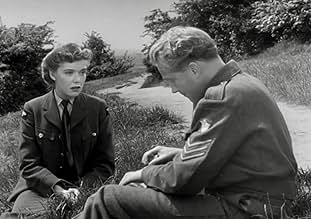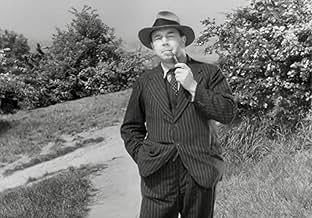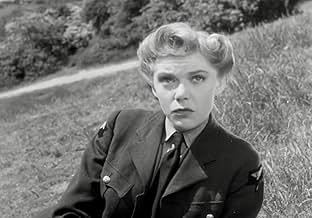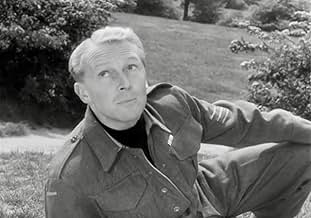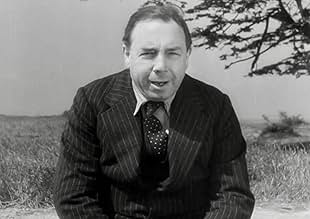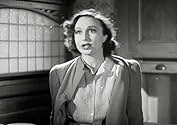Agrega una trama en tu idiomaAdapted from a J.B. Priestley play with many of the original actors. The tale of various people who have come to live in an "ideal" city and their hopes and reasons for doing so.Adapted from a J.B. Priestley play with many of the original actors. The tale of various people who have come to live in an "ideal" city and their hopes and reasons for doing so.Adapted from a J.B. Priestley play with many of the original actors. The tale of various people who have come to live in an "ideal" city and their hopes and reasons for doing so.
- Dirección
- Guionistas
- Elenco
Mabel Terry-Lewis
- Lady Loxfield
- (as Mabel Terry Lewis)
Fanny Rowe
- Philippa Loxfield
- (as Frances Rowe)
Brenda Bruce
- WAAF
- (sin créditos)
Ralph Michael
- Sergeant Jimmy
- (sin créditos)
J.B. Priestley
- J.B. Priestley
- (sin créditos)
Johnnie Schofield
- Bert the Barman
- (sin créditos)
Opiniones destacadas
Not exactly highly entertaining but it's not supposed to be entertaining as it's a comparison of posh rich people to poor ones.
Unsurprisingly the rich posh ones are not keen on a society where all are equal so the privileged positions that they currently enjoy would be lost. Eighty years later and nothing has changed as the rich continue to get richer and the poor get poorer.
My favourite character was the washerwoman who held the film together with her comments.
The set must have been very cheap to construct as it seemed to have been made of plywood painter to resemble stone.
Worth a watch but don't expect any excitement like a car chase for example.
Unsurprisingly the rich posh ones are not keen on a society where all are equal so the privileged positions that they currently enjoy would be lost. Eighty years later and nothing has changed as the rich continue to get richer and the poor get poorer.
My favourite character was the washerwoman who held the film together with her comments.
The set must have been very cheap to construct as it seemed to have been made of plywood painter to resemble stone.
Worth a watch but don't expect any excitement like a car chase for example.
The main title actually says 'J. B. Priestley's They Came to a City', and the film constitutes the second of three brief wartime flirtations with fantasy by Ealing Studios.
Coming late in the war when enlightened opinion was already contemplating what was to come next, the ideals it expressed had already found voice in the Boulting Brothers short 'Dawn Guard' and thematically owed a lot to Sutton Vane's 'Outward Bound', James Hilton's 'Lost Horizon' and Priestley's own 1937 fantasy 'I Have Been Here Before'; while the striking production design seems to show the influence of German silent cinema.
Beginning and ending with the genial figure of Mr Priestley ambling on and off, it's not for all tastes, but is certainly quite unlike any other British film before or after.
Coming late in the war when enlightened opinion was already contemplating what was to come next, the ideals it expressed had already found voice in the Boulting Brothers short 'Dawn Guard' and thematically owed a lot to Sutton Vane's 'Outward Bound', James Hilton's 'Lost Horizon' and Priestley's own 1937 fantasy 'I Have Been Here Before'; while the striking production design seems to show the influence of German silent cinema.
Beginning and ending with the genial figure of Mr Priestley ambling on and off, it's not for all tastes, but is certainly quite unlike any other British film before or after.
A British drama; A story about how people might live if they were presented with the opportunity to live in a utopia, an "ideal" city, exploring their hopes and reasons for doing so. This is an eloquent, stagy allegory based on a play of the same title by J. B. Priestley. The direction, acting, and photography are all good, apart from occasional fits of overcooked melodrama within its bounds. It is an intelligent screenplay, but the tale within it lacks cinematic dimension with long, static sequences of dialogue; the audience is robbed of the pictorial element of what is hinted at about the mysterious settlement. Tied to this is a quite heavy political slant in the script, which is left for the viewer to accept as a task rather than for them to explore by diversion; the audience is locked out. Though the theme of universal friendship is explored well.
Nine disagreeable Britons representing different social/economic classes are mysteriously transported to a place with a door. As they wait for the door to open, we get to know them better. Eventually the door opens, and they go explore a city which the audience never sees. T The idea is that post WW2, England should become a more fair and equitable society with people who treat each other well. When the characters find themselves in such a city they have different reactions. It's interesting how some of the selfish ones try to emotionally drag those who want to live in the city back to their miserable lives. There is an episode involving a mother and daughter that is very similar to an episode in C. S. Lewis' novel "The Great Divorce" written 12 years later. It made me wonder if Mr. Lewis ever saw the film. Note: "They Came To A City" is similar to watching a stage play. At only 66 minutes long it's worth a look.
A very pleasant surprise. This is an allegory about an imagined socialist paradise, and the judgements that various archetypical citizens would have of it. I Loved it.
It happens that I watched this - on FUBI - on the same night that I watched a documentary about Jane Jacobs, the sociologist of cities and advocate of bottom-up community building. This was a perfect follow up.
It's presented as a series of exchanges between the disparate characters, contrasting their values, experience and social orientation. While it could be criticized as didactic and predictable, I found it well executed and fun. I especially loved Googie Withers as the working class gal whose been around the block a few times but isn't ready to go cynical.
In tone and flavor it's like a blend of Capra with Powell & Pressburger.
It happens that I watched this - on FUBI - on the same night that I watched a documentary about Jane Jacobs, the sociologist of cities and advocate of bottom-up community building. This was a perfect follow up.
It's presented as a series of exchanges between the disparate characters, contrasting their values, experience and social orientation. While it could be criticized as didactic and predictable, I found it well executed and fun. I especially loved Googie Withers as the working class gal whose been around the block a few times but isn't ready to go cynical.
In tone and flavor it's like a blend of Capra with Powell & Pressburger.
¿Sabías que…?
- TriviaFinal film of Mabel Terry-Lewis.
- Citas
Alice Foster: I never thought there *could* be a place as good as this.
- ConexionesFeatured in Sosialismi (2014)
- Bandas sonorasMusic selected from The Divine Poem
Music by Aleksandr Skryabin (as Scriabin)
Played by The London Philharmonic Orchestra
Conducted by Ernest Irving
Selecciones populares
Inicia sesión para calificar y agrega a la lista de videos para obtener recomendaciones personalizadas
Detalles
- Tiempo de ejecución1 hora 18 minutos
- Color
- Relación de aspecto
- 1.37 : 1
Contribuir a esta página
Sugiere una edición o agrega el contenido que falta

Principales brechas de datos
By what name was They Came to a City (1944) officially released in India in English?
Responda
